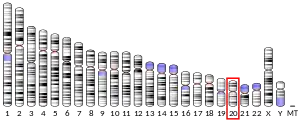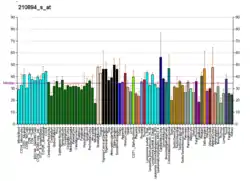CEP250
Centrosome-associated protein CEP250 is a protein that in humans is encoded by the CEP250 gene.[5][6][7] This gene encodes a core centrosomal protein required for centriole-centriole cohesion during interphase of the cell cycle. The encoded protein dissociates from the centrosomes when parental centrioles separate at the beginning of mitosis. The protein associates with and is phosphorylated by NIMA-related kinase 2, which is also associated with the centrosome.[7] Furthermore, CEP135 is also required for the centriolar localization of CEP250.[8]
References
- GRCh38: Ensembl release 89: ENSG00000126001 - Ensembl, May 2017
- GRCm38: Ensembl release 89: ENSMUSG00000038241 - Ensembl, May 2017
- "Human PubMed Reference:". National Center for Biotechnology Information, U.S. National Library of Medicine.
- "Mouse PubMed Reference:". National Center for Biotechnology Information, U.S. National Library of Medicine.
- Mack GJ, Rees J, Sandblom O, Balczon R, Fritzler MJ, Rattner JB (Apr 1998). "Autoantibodies to a group of centrosomal proteins in human autoimmune sera reactive with the centrosome". Arthritis Rheum. 41 (3): 551–8. doi:10.1002/1529-0131(199803)41:3<551::AID-ART22>3.0.CO;2-X. PMID 9506584.
- Fry AM, Mayor T, Meraldi P, Stierhof YD, Tanaka K, Nigg EA (Aug 1998). "C-Nap1, a Novel Centrosomal Coiled-Coil Protein and Candidate Substrate of the Cell Cycle–regulated Protein Kinase Nek2". J Cell Biol. 141 (7): 1563–74. doi:10.1083/jcb.141.7.1563. PMC 2133000. PMID 9647649.
- "Entrez Gene: CEP250 centrosomal protein 250kDa".
- Kim K, Lee S, Chang J, Rhee K (December 2008). "A novel function of CEP135 as a platform protein of C-NAP1 for its centriolar localization". Exp. Cell Res. 314 (20): 3692–700. doi:10.1016/j.yexcr.2008.09.016. PMID 18851962.
External links
- Human CEP250 genome location and CEP250 gene details page in the UCSC Genome Browser.
Further reading
- Gerhard DS, Wagner L, Feingold EA, et al. (2004). "The Status, Quality, and Expansion of the NIH Full-Length cDNA Project: The Mammalian Gene Collection (MGC)". Genome Res. 14 (10B): 2121–7. doi:10.1101/gr.2596504. PMC 528928. PMID 15489334.
- Jin J, Smith FD, Stark C, et al. (2004). "Proteomic, functional, and domain-based analysis of in vivo 14-3-3 binding proteins involved in cytoskeletal regulation and cellular organization". Curr. Biol. 14 (16): 1436–50. doi:10.1016/j.cub.2004.07.051. PMID 15324660. S2CID 2371325.
- Colland F, Jacq X, Trouplin V, et al. (2004). "Functional Proteomics Mapping of a Human Signaling Pathway". Genome Res. 14 (7): 1324–32. doi:10.1101/gr.2334104. PMC 442148. PMID 15231748.
- Faragher AJ, Fry AM (2004). "Nek2A kinase stimulates centrosome disjunction and is required for formation of bipolar mitotic spindles". Mol. Biol. Cell. 14 (7): 2876–89. doi:10.1091/mbc.E03-02-0108. PMC 165683. PMID 12857871.
- Strausberg RL, Feingold EA, Grouse LH, et al. (2003). "Generation and initial analysis of more than 15,000 full-length human and mouse cDNA sequences". Proc. Natl. Acad. Sci. U.S.A. 99 (26): 16899–903. doi:10.1073/pnas.242603899. PMC 139241. PMID 12477932.
- Mayor T, Hacker U, Stierhof YD, Nigg EA (2003). "The mechanism regulating the dissociation of the centrosomal protein C-Nap1 from mitotic spindle poles". J. Cell Sci. 115 (Pt 16): 3275–84. PMID 12140259.
- Deloukas P, Matthews LH, Ashurst J, et al. (2002). "The DNA sequence and comparative analysis of human chromosome 20". Nature. 414 (6866): 865–71. doi:10.1038/414865a. PMID 11780052.
- Mayor T, Stierhof YD, Tanaka K, et al. (2000). "The Centrosomal Protein C-Nap1 Is Required for Cell Cycle–Regulated Centrosome Cohesion". J. Cell Biol. 151 (4): 837–46. doi:10.1083/jcb.151.4.837. PMC 2169446. PMID 11076968.
- Hirsch DS, Pirone DM, Burbelo PD (2001). "A new family of Cdc42 effector proteins, CEPs, function in fibroblast and epithelial cell shape changes". J. Biol. Chem. 276 (2): 875–83. doi:10.1074/jbc.M007039200. PMID 11035016.
- Helps NR, Luo X, Barker HM, Cohen PT (2001). "NIMA-related kinase 2 (Nek2), a cell-cycle-regulated protein kinase localized to centrosomes, is complexed to protein phosphatase 1". Biochem. J. 349 (Pt 2): 509–18. doi:10.1042/0264-6021:3490509. PMC 1221174. PMID 10880350.
This article is issued from Wikipedia. The text is licensed under Creative Commons - Attribution - Sharealike. Additional terms may apply for the media files.






